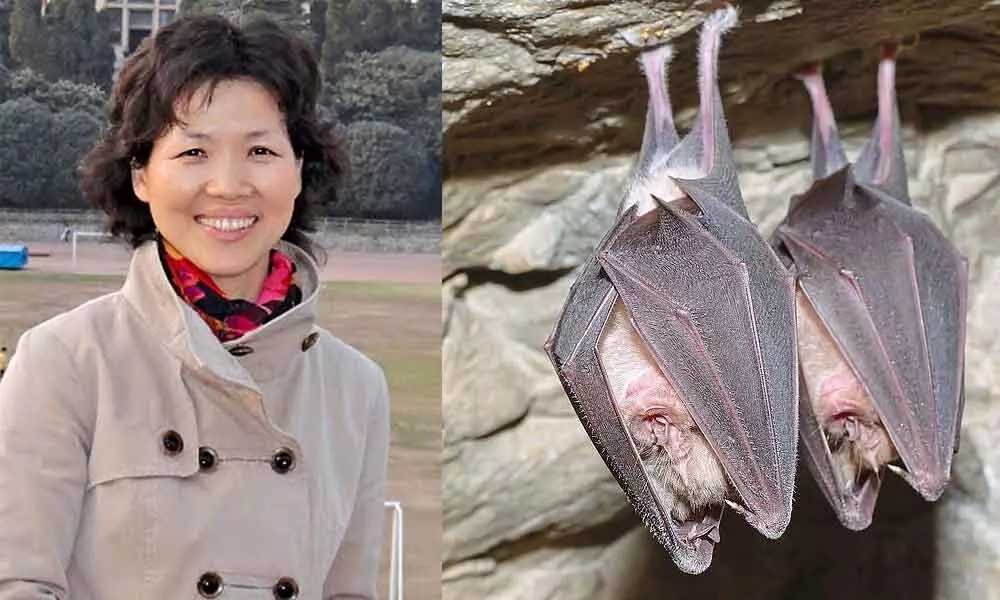Live
- Over 7,600 Syrians return from Turkiye in five days after Assad's downfall: minister
- Delhi BJP leaders stay overnight in 1,194 slum clusters
- Keerthy Suresh and Anthony Thattil Tie the Knot in a Christian Ceremony
- AAP, BJP making false promises to slum dwellers for votes: Delhi Congress
- 'Vere Level Office' Review: A Refreshing Take on Corporate Life with Humor and Heart
- Libya's oil company declares force majeure at key refinery following clashes
- Illegal Rohingyas: BJP seeks Assembly session to implement NRC in Delhi
- Philippines orders full evacuation amid possible volcanic re-eruption
- Government Prioritizes Welfare of the Poor, says Dola Sri Bala Veeranjaneyaswamy
- Two Russian oil tankers with 29 on board damaged due to bad weather
Just In
China hushed up findings of Bat Woman scientist who unlocked Corona's genetic make-up


Beijing: A Chinese scientist who is one of the world's leading experts on coronaviruses was 'muzzled' after unraveling the genetic composition of the...
Beijing: A Chinese scientist who is one of the world's leading experts on coronaviruses was 'muzzled' after unraveling the genetic composition of the new disease, which is crucial for developing diagnostic tests and vaccines. The revelation will fuel fresh concerns over China's cover-up of the pandemic after it erupted in the city of Wuhan.
Critics argue that Communist Party chiefs frustrated efforts to contain the outbreak before it exploded around the world.
At the centre of the new claims is Shi Zhengli, known as China's 'Bat Woman' after years spent on difficult virus-hunting expeditions in dank caves that have led to a series of important scientific discoveries. The virologist was called back to her high security laboratory in Wuhan at the end of last year after a mysterious new respiratory condition in the city was identified as a novel coronavirus – and within three days she completed its gene sequencing. Her team's work, and several other breakthroughs in subsequent days, indicated the virus was linked to horseshoe bats found more than 1,000 miles away in Yunnan, a region of southern China.
Their findings showed it was similar to SARS, a respiratory disease that sparked an epidemic in 33 countries after emerging from China in 2002.
Gao Yu, a Chinese journalist freed last week after 76 days of lockdown in Wuhan, said he spoke to Shi during his incarceration and revealed: 'We learned later her institute finished gene-sequencing and related tests as early as January 2 but was muzzled.' The Mail on Sunday has learned that on that same day, Yanyi Wang, director of the Wuhan Institute of Virology, sent an email to staff and key officials ordering them not to disclose information on the disease. She warned, according to a leak on social media confirmed by activists and Hong Kong media, that 'inappropriate and inaccurate information 'was causing 'general panic' – thought to refer to eight whistle-blowing doctors whose warnings to local citizens had led to their arrest. Wang said the National Health Commission 'unequivocally requires that any tests, clinical data, test results, conclusions related to the epidemic shall not be posted on social media platforms, nor shall [it] be disclosed to any media outlets including government official media, nor shall [it] be disclosed to partner institutions.' Eight days later, a team led by a professor in Shanghai who received samples from an infected patient, published a genome sequence on an open access platform. His laboratory was closed for 'rectification' two days later. At the time, the public was being told that no new cases had been reported in Wuhan for more than a week and there was no clear evidence of human transmission, although dozens of health workers were starting to fall ill with the disease.
In an online lecture last month, Shi Zhengli said her team found on January 14 that the new virus could infect people – six days before this fact was revealed by China. On the same day, the World Health Organisation issued a tweet backing China's denials of human transmissions. Shi's team released its data identifying the disease on January 23 on a scientific portal before publication the next month by the journal Nature. It said the genomic sequence was 96 per cent identical to another virus they found in horseshoe bats in Yunnan. Shi is a specialist in emerging diseases and has earned global acclaim for work investigating links between bats and coronaviruses, aided by expeditions to collect samples and swabs in the fetid cave networks of southern China.
She was a key part of the team that traced SARS to horseshoe bats through civets, a cat-like creature often eaten in China.

© 2024 Hyderabad Media House Limited/The Hans India. All rights reserved. Powered by hocalwire.com






